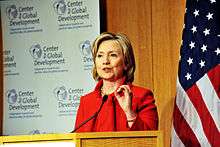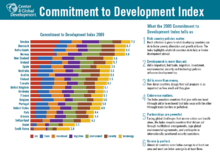Center for Global Development
 | |
| Abbreviation | CGD |
|---|---|
| Motto | Independent research and practical ideas for global prosperity. |
| Formation | 2001 |
| Type | Think tank |
| Headquarters | 2055 L Street NW |
| Location |
|
President | Nancy Birdsall |
Budget |
Revenue: $13,275,268 Expenses: $14,542,729 (FYE 2014)[1] |
| Website | www.cgdev.org |
The Center for Global Development (CGD) is a U.S. nonprofit think tank based in Washington, D.C. that focuses on international development.
It was founded in November 2001 by former senior U.S. official Edward W. Scott, director of the Peterson Institute for International Economics, C. Fred Bergsten, and Nancy Birdsall. Birdsall, the former Vice President of the Inter-American Development Bank and former Director of the Policy Research Department at the World Bank, became the Center's first President. Lawrence Summers was unanimously elected in March 2014 by the CGD Board of Directors to succeed founding Board Chair Edward Scott, Jr., on May 1, 2014.[2]
CGD was ranked the 13th most prominent think tank in the international development sphere by University of Pennsylvania's "2015 Global Go To Think Tank Index Report".[3] In 2009,[4] Foreign Policy Magazine's Think-Tank Index listed CGD as one of the top 15 overall think-tanks in the USA.[5] CGD's stated mission is "to reduce global poverty and inequality by encouraging policy change in the United States and other rich countries through rigorous research and active engagement with the policy community.[6] The Center considers itself to be a "think and do" tank, with an emphasis on producing research that is channeled into practical policy proposals.[7]
CGD is well known for leading debt-relief programs, specifically in Nigeria and Liberia. CGD Vice President Todd Moss first proposed the Nigerian debt buy-back, which resulted in the Paris Club of rich nations forgiving 60% of $31 billion of debt.[8] Former CGD senior fellow Steve Radelet advised Liberian President Ellen Johnson Sirleaf and her senior advisors on debt relief and aid coordination.
CGD is also known for creating the program called advance market commitments to encourage vaccine development for specific diseases. The G7 endorsed the approach and the Gates Foundation and five countries gave $1.5 billion to create a vaccine against strains of pneumonia.[9]
In cooperation with Foreign Policy, CGD has published the Commitment to Development Index since 2003. The annual index ranks countries based on how their foreign aid, trade, migration, investment, environment, security and technology policies encourage global development.[10]
The Center for Global Development in Europe was established in October 2011 with the aim of engaging with and learning from policymakers, academics, and researchers in Europe, and bringing the CGD blend of evidence-led, high-quality research and engagement to European policymaking and engagement about development. "CGD in Europe" research initiatives include "Europe Beyond Aid", Development Impact Bonds, and Illicit Financial Flows.
In November 2013, CGD purchased a new headquarters that includes a 170-seat state-of-the-art conference center, a 60-seat boardroom/ideas lab, and a multimedia studio.
Research
CGD conducts research within a range of topics that impact global poverty and people of the developing world. Topics include aid effectiveness, education, globalization and global health, as well as the impact of trade and migration on development.
The Center is well known for its research on aid effectiveness. CGD President Nancy Birdsall recently developed Cash on Delivery (COD) Aid, an initiative aimed to improve aid effectiveness by focusing foreign aid on outcomes, not inputs.[11]
In 2008, CGD produced a compilation of essays edited by Nancy Birdsall called "The White House and the World: A Global Development Agenda for the Next U.S. President". These essays give policy recommendations to solve international problems, such as global health, foreign aid policy, migration, global warming and foreign direct investment.[12]
CGD recently published a report on the dangers of drug resistance in “The Race against Drug Resistance: When Medicines Fail”, which the Global Health team launched on June 14, 2010.[13]
In addition to print publications,[14] CGD maintains several blogs, including Views From the Center and the Global Health Policy blog.
Other research topics listed on their website include capital flows/financial crises, debt relief, environmental issues, economic growth, governance/democracy, international financial institutions, finance, food and agriculture, inequality, population, poverty, private investment, security and development, and data sets and resources.[15]
Funding
CGD receives funding from foundations, governments, individuals, and corporations. The organization publishes information on its website for all grants and donations received that are above $100,000. CGD received the highest rating (five stars) from Transparify for its open disclosure of funding in 2014 and 2015.[16] In 2013, the government of Norway gave CGD $5 million to support its work on tropical forests and development. That support was cited in a New York Times article about think tank funding.[17]
Initiatives
The Center considers itself a “think and do” tank, and thus has multiple initiatives to implement their policy suggestions. These, initiatives attempt to give specific policy recommendations to organizations while creating a dialogue.[18]
In 2003, David Roodman created the Commitment to Development Index with Foreign Policy magazine and Mapping Worlds. The Commitment to Development Index (CDI)[10] ranks and analyzes nations’ financial and political commitments to development every year. The index uses interactive graphs and analyzes how countries contribute to development in seven policy areas: aid (both quantity as a share of income and quality), trade, investment, migration, environment, security, and technology.[19]
Other initiatives include Cash on Delivery Aid,[20] Combating Drug Resistance,[21] Development Impact Bonds,[22] Europe Beyond Aid,[23] the Latin America Initiative,[24] Migration as a Tool for Disaster Recovery,[25] Oil-to-Cash: Fighting the Resource Curse through Cash Transfers,[26] Pakistan: US Development Strategy,[27] Preemptive Contract Sanctions,[28] Reforming Trade Preferences,[29] Rethinking US Development Policy,[30] The Future of the World Bank,[31] Tropical Forests for Climate and Development,[32] Understanding India,[33] and Value for Money: An Agenda for Global Health Funding Agencies.[34]
Carbon Monitoring for Action (CARMA)
Carbon Monitoring For Action (CARMA) is a website produced and financed by the Center that contains a searchable database that estimates the carbon emissions of power plants and power companies around the world. Launched in November 2007, its database is updated quarterly.[35]
Events

CGD hosts about 200 public and private events a year that draw more than 7,000 participants.[36] Events have featured speakers such as U.S. Secretary of State Hillary Clinton, President of Nigeria Goodluck Jonathan, economist Paul Romer, UK Secretary of State for International Development Andrew Mitchell, among many others.[37]
During Secretary Hillary Clinton’s visit to CGD on January 6, 2010, she emphasized the importance of development and said it was “time to elevate development as a central pillar of our foreign policy and to rebuild USAID into the world's premier development agency”.[38]
CGD hosts an annual lecture series called the Sabot Lecture series, in honor of the late development economist Richard "Dick" Sabot. Each year, the Sabot Lecture hosts a scholar-practitioner who has made significant contributions to international development, combining academic work with leadership in the policy community. Past Sabot speakers include Lawrence Summers, Ngozi Okonjo-Iweala, Lord Nicholas Stern, Kemal Dervis and Kenneth Rogoff.[39]
Fellows
Resident Fellows
|
|
|
Visiting Fellows
|
|
|
Non-Resident Fellows
|
|
|
See also
References
- ↑ "Center for Global Development" (PDF). Foundation Center. 31 December 2014. Retrieved 11 April 2016.
- ↑ "Lawrence Summers to Become Board Chair of the Center for Global Development". Centre for Global Development. Retrieved February 12, 2014.
- ↑ "Global Go To Think Tank Index Report". University of Pennsylvania. Retrieved 8 June 2016.
- ↑ "The Think Tank Index (Foreign Policy Magazine)". Center for Global Development. 1 February 2009. Retrieved 8 June 2016.
- ↑ "Coming Soon". Foreign Policy. Retrieved December 31, 2011.
- ↑ "About CGD". Cgdev.org. Retrieved December 31, 2011.
- ↑ "Building a Think-and-Do Tank: A Dozen Lessons from the First Dozen Years of the Center for Global Development". Center for Global Development. 14 January 2014. Retrieved 8 June 2016.
- ↑ “Clean Slate”, The Economist, October 2005
- ↑ "Advanced Market Commitments: Saving Lives With Affordable Vaccines", Gates Foundation, accessed July 26, 2010
- 1 2 "Commitment to Development Index". Cgdev.org. Retrieved December 31, 2011.
- ↑ "Cash on Delivery Aid Initiative". Cgdev.org. March 16, 2010. Retrieved December 31, 2011.
- ↑ "The White House and the World: A Global Development Agenda for the Next U.S. President". Cgdev.org. August 22, 2008. Retrieved December 31, 2011.
- ↑ "The Race against Drug Resistance: When Medicines Fail". Cgdev.org. June 14, 2010. Retrieved December 31, 2011.
- ↑ "References". Cgdev.org. Retrieved December 31, 2011.
- ↑ "List of CGD Topics". Cgdev.org. Retrieved December 31, 2011.
- ↑ "Transparify". Transparify.org. Retrieved 2015-05-20.
- ↑ LIPTON, ERIC; WILLIAMS, BROOKE (6 September 2014). "Foreign Powers Buy Influence at Think Tanks". www.nytimes.com. New York Times. Retrieved 7 September 2014.
- ↑ "List of CGD Initiatives". Cgdev.org. Retrieved December 31, 2011.
- ↑ "Inside the Commitment to Development Index". Cgdev.org. Retrieved December 31, 2011.
- ↑ "Cash on Delivery Aid". Cgdev.org. Retrieved 21 January 2014.
- ↑ "Combating Drug Resistance". Retrieved 21 January 2014.
- ↑ "Development Impact Bonds". Retrieved 21 January 2014.
- ↑ "Europe Beyond Aid". Retrieved 21 January 2014.
- ↑ "Latin America Initiative". Retrieved 21 January 2014.
- ↑ "Migration as a Tool for Disaster Recovery". Retrieved 21 January 2014.
- ↑ "Oil-to-Cash: Fighting the Resource Curse through Cash Transfers". Retrieved 21 January 2014.
- ↑ "Pakistan: US Development Strategy". Retrieved 21 January 2014.
- ↑ "Preemptive Contract Sanctions". Retrieved 21 January 2014.
- ↑ "Reforming Trade Preferences". Retrieved 21 January 2014.
- ↑ "Rethinking US Development Policy". Retrieved 21 January 2014.
- ↑ "The Future of the World Bank". Retrieved 21 January 2014.
- ↑ "Tropical Forests for Climate and Development". Retrieved 21 January 2014.
- ↑ "Understanding India". Retrieved 21 January 2014.
- ↑ "Value for Money: An Agenda for Global Health Funding Agencies". Retrieved 21 January 2014.
- ↑ Gorrie, Peter (15 November 2007). "Website tracks world's worst polluting power plants". Toronto Star. Retrieved 2009-06-16.
- ↑ CGD Annual Report Archived November 9, 2011, at the Wayback Machine.
- ↑ "Event Calendar : Center for Global Development (CGD)". Cgdev.org. Retrieved December 31, 2011.
- ↑ "Hillary Clinton on Development in the 21st century", Foreign Policy, January 6, 2010
- ↑ "Richard H. Sabot Lecture Series". Center for Global Development. Retrieved 23 July 2014.
External links
- Center for Global Development website
- Carbon Monitoring for Action (CARMA)
- International Health Partnership (IHP+)
